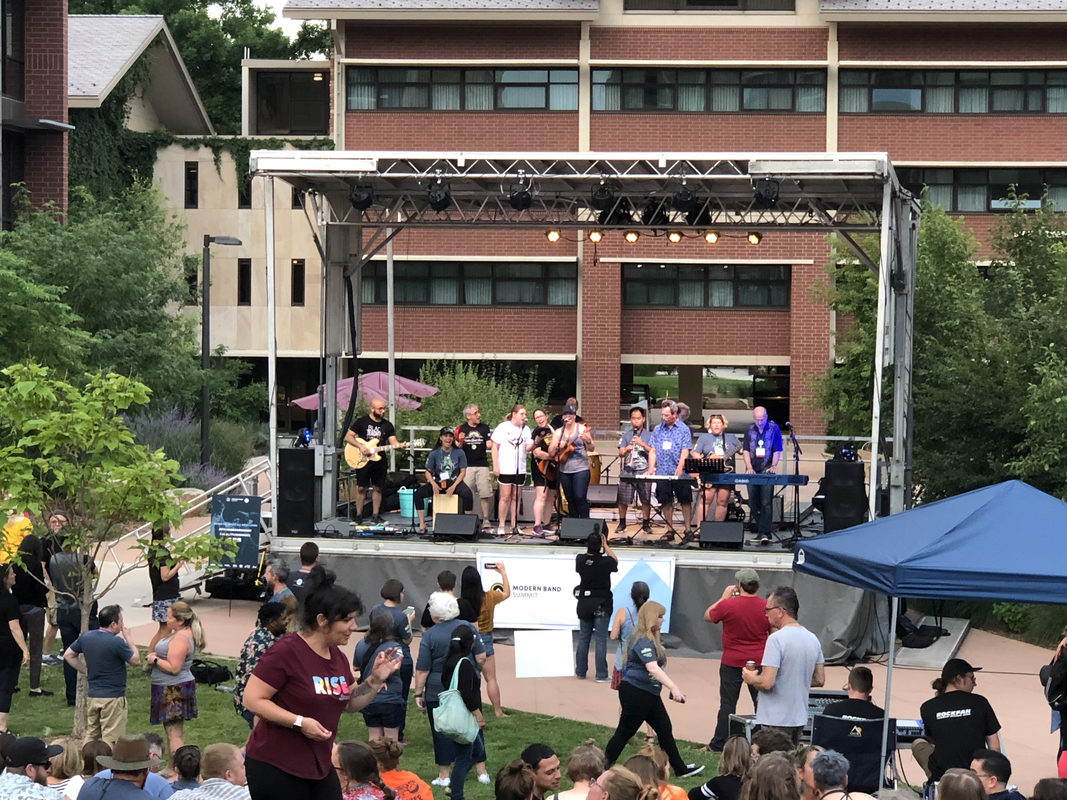|
“...it contains the world.
- Charles Limb I’m Totally Excited! I’ve never been so excited about music education! That may seem like a Pollyannaism, but I am honestly looking forward to our future of teaching music with children and adults. You might be asking, “What’s there to be excited about?” Plenty! First, this past summer I had the privilege of traveling to Washington DC to represent IMEA at the NAfME National Assembly. Prior to the first day of the assembly, IMEA Secretary Lisa Ott, Collegiate IMEA President Dylan Root from Morningside College and I participated in Hill Day. This is a day where we walk around between Senate and House buildings meeting with our Iowa US Senators and Representatives. We visited the offices of Dave Loebsack, Abby Finkenauer, Cindy Axne, Joni Ernst and Charles Grassley. We talked to them about the importance of funding Titles I, II and IV of the Every Student Succeeds Act, the Higher Education Act and voting to support the GAAME (Guaranteed Access to Arts and Music Education) Act. We weren’t advocating for music education. Instead, we were talking to our legislators and staff to ask them to represent music educators by voting to support initiatives that affect music education and our students. Of course we were asking for detailed votes, but ultimately it was the stories we told about what is happening in Iowa music classrooms that made the largest impact. Lisa shared about students in Nevada who have stayed in school because of music and the Title I funding that supported it. She also shared how her students of diverse ethnicities encounter diverse teachers and are then encouraged to go into teaching. Legislators heard a story from Dylan about how music changed the lives of children with disabilities in Sioux City. I shared how modern bands in Cedar Falls and Waterloo are opening the doors of music to children that were previously closed. In every meeting, regardless of the letter that appears in parentheses next to their name, they were able to understand how music can be powerful. There was never a debate on whether music was good or bad. In fact, when our group was announced as visitors in Senator Charles Grassley’s office, a person in the office said, “Music teachers? Cool!” That’s right. Music teachers! Because we could connect with the people who manage our country’s government while agreeing about the power of music makes me excited about music education. Second, my wife Shelley and I attended the 6th Annual Modern Band Summit in Ft. Collins, Colorado again this summer. We attended this last summer (see Fall 2018 issue) and were so affected by the conference, we had to return again. This conference was attended by music teachers, general education teachers, arts coordinators, superintendents, college professors, business professionals and teaching artists. Not to mention musical rockstars like bassist Victor Wooten and dummer Hannah Welton-Ford. The summit is four days filled with sessions, presentations, concerts, jam sessions, games, meals and jam sessions (many jam sessions!). On the second night of the summit, a bowling alley was rented out and a stage was set-up across 3 lanes. While people bowled in the other lanes, teachers signed up to get into groups and perform songs on stage. The crowd cheered on every group and there was even a mosh pit (though relatively calm) at front of the stage. This is the second reason I’m excited about the future of music education. We met music educators young and old who couldn’t wait for school to start to try the new things they’ve learned. As I write this, their Facebook page is constantly updating with teachers showing off their rooms and what they have planned. They put out questions to the community that are immediately answered by many. These are teachers from Maine to Hawaii and I felt a part of huge enthusiastic buzz for “more music for more kids.” One of the featured guests of the Modern Band Summit was neuroscientist and surgeon Charles Limb (see his Your Brain on Improv TED Talk). He has studied how the brain works during music making and especially during improvisation. Although he practices an unbiased scientific approach to studying music, he is a strong believer in the power of music to communicate with others and to bring people together. He said that “music doesn’t need advocacy.” Using the example of a 40,000 year old bone flute as evidence that music has been around since the earliest evidence of human existence, LImb said music will continue to exist with or without advocacy. While driving in a car listening to music, Lamb’s daughter once asked him why he loves music so much. His answer was simple: “Because it contains the world.” When meeting with members of the US Congress and jamming with music teachers in Colorado, I realized the musical experiences we provide for our children are CRUCIAL!!! Think about the students attending any high school in Iowa. How many of those students will be our future senators, representatives, school board members, business leaders, philanthropists, doctors, city council members, volunteers, principals, superintendents and parents? Basically, which one’s will be making decisions about the future of our society and how many of those are leaving high school with a memorable musical experience? I don’t know, but to hedge our bets, we need to get more students doing more music...NOW! This is why I’m so excited for music education. There is so much to do with music and as Limb says, “It contains the world.”
0 Comments
This summer I had one of the most enjoyable and rewarding experiences I’ve had as a music educator. My partner Shelley and I attended the Modern Band Summit in Fort Collins, Colorado. Their website provides the best description of the conference. Modern Band Summit convenes music educators, arts administrators, and college and university professors from across the country to advance Modern Band in our schools. This four-day professional development conference includes teacher-led workshops, special guest speakers, and nightly jam sessions that foster creativity and community in a peer network of more than 2,000 Modern Band practitioners nationwide (https://www.littlekidsrock.org/mbsummit). This summer was the sixth year of the conference. It’s organized by LIttle Kids Rock, a non-profit school music organization that trains music teachers and donates instruments, resources and support so that teachers can teach modern band. The former name of the conference was “Modern Band Rockfest.” This provides an idea of the kind of atmosphere one can experience when attending. It was unlike any other conference I’ve attended. First of all, many teachers attend the Modern Band Summit with little to no experience teaching modern band. On the first day, all teachers who are new to modern band are enrolled in Modern Band 101. This one-day training provides teachers with resources and pedagogy for teaching modern band. In addition, teachers learn about the music as a second language philosophy on which the pedagogy is built. The conference creates a very welcoming environment for teachers not familiar with modern band because it gives them an opportunity to learn the basics in order to take advantages of the other sessions. A very important aspect of modern band pedagogy is that it differs significantly from school to school and from teacher to teacher. Because the music used in modern band is connected to the students and community, there is no one prescribed curriculum. This can be refreshing for those wanting to make music relevant to their students’ lives, but a bit uncomfortable for those brand new to modern band and looking for set activities. Second, there is an immediate observable difference between the Modern Band Summit and other conferences: teachers are walking around with guitars, basses and drumsticks. For most conferences I attend, teachers are only walking around with bags and their conference program. At the Modern Band Summit, teachers attend sessions to improve their instrumental skills and their teaching skills. Guitars are checked out to any attendee who doesn’t have their own guitar. At many sessions, teachers are encouraged to use any instrument they have to contribute to the current activity. This leads to the third and probably most enjoyable aspect of the Modern Band Summit. It’s an extremely welcoming and supportive environment of teachers passionate about getting “more music to more people, that is relevant to their lives and for more of their lives” (paraphrased from Little Kids Rock founder Dave Wish). Teachers were enthusiastic about sessions and spent much of their time sharing how they teach modern band. During sessions, teachers are encourage each other to participate and learn. Nightly jam sessions are fill with teachers getting on stage and making music for everyone else. The demographics of the Modern Band Summit is a mix of elementary, middle school and high school music teachers along with administrators, professional musicians and university professors. Attendees come from all over the country including New York, Chicago, Dallas, Miami, Colorado and Southern California. This combination of teachers from all over provides a view of how the modern band movement is growing in the United States.
I said that this experience was one of the most enjoyable and rewarding experiences I’ve had as a music educator because I was able to make music with other educators and also share ideas about how to reach more students with music. (Having the conference in Ft. Collin near the foothills of the Rocky Mountain doesn’t hurt). Our National Association for Music Education promotes “Music for Everyone.” (NAfME..org). The Modern Band Summit provided by Little Kids Rock is taking steps toward this goal. This is heartwarming and rewarding to experience in person. For more information about the Modern Band Summit, go to https://www.littlekidsrock.org/mbsummit/ |
Kevin DroeKevin is President of IMEA for 2019-20. Archives
November 2020
Categories |


 RSS Feed
RSS Feed